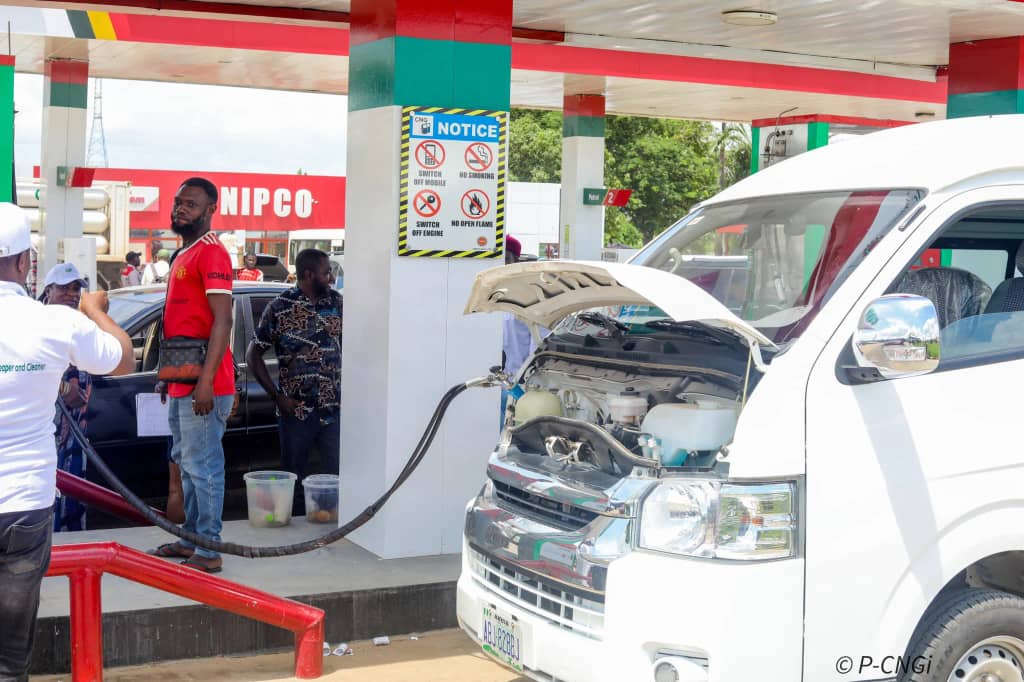By Emmanuel Afonne, News Agency of Nigeria (NAN)
For decades, Nigeria’s energy sector has faced major infrastructure gaps, especially in the midstream and downstream gas sub-sector.
In spite of the country’s abundant natural gas reserves, limited processing plants, poor storage and distribution systems have clogged the wheel of progress.
More so, few refueling stations have hindered the full utilisation of gas as a cleaner and more affordable energy source.
This shortfall has increased dependence on petroleum products, leading to higher costs for homes and businesses.
The gap is also slowing the transition to sustainable energy alternatives such as the Compressed Natural Gas (CNG).
Motorists in the Federal Capital Territory (FCT) have lamented the difficulty associated with sourcing the CNG, as they spend up to 10 hours waiting on the queue for a refill due to its affordability.
Mr Azubuike Anyaorah, a motorist, said that infrastructure had been the major challenge of accessing CNG in FCT.
“We have been suffering to get CNG in FCT; we join the queue for CNG as early as 5 a.m., and then succeed to get a refill around 3 p.m., thereby rendering the day’s business useless for us.
“Government’s intention is genuine but the aim is defeated with the difficulty associated with getting the product.
“Allowing more stations to dispense CNG will go a long way in addressing poverty in the land,” Anyaorah said.
In January 2024, President Bola Tinubu approved the appointment of the Governing Council of the Midstream and Downstream Gas Infrastructure Fund (MDGIF), with Ekperikpe Ekpo, the Minister of State for Petroleum Resources (Gas) as Chairman, and Mr Oluwole Adama as Executive Director.
Observers say since then, the team has provided clear direction to ensure that the Fund’s interventions align with national objectives for energy transition, industrial growth and energy security.
“To date, 16 companies including FEMADEC Energy Limited, Topline Limited, Asiko Energy Holdings Limited, Ibile Oil and Gas Corporation, Rolling Energy Limited, Nsik Oil and Gas Limited, Ant Energy Limited, as well as Amari Energy Resources Limited, have benefited from MDGIF’s support.
“Other beneficiaries are Sub-sea 9 Gas Limited, Deemah Integrated Services Limited, LNG Arete Limited, VTT LNG West Africa Limited, Geospectra Energy Limited, Waterdance International Concepts Limited, WishnefiskyGlobal Limited and Ssonic Petroleum Limited.
“Significant progress is already visible across the projects being implemented by these companies, as FEMADEC Energy Limited is establishing CNG refueling stations in 20 universities nationwide.
“So far, five stations have been commissioned at Obafemi Awolowo University, Osun, Yakubu Gowon University, Abuja, Ahmadu Bello University, Zaria, Federal University of Technology, Owerri, and the University of Uyo in Akwa Ibom, with additional stations expected to come on stream by December 2025.
“Asiko Energy Holdings Limited is constructing a 5,000 MT LPG/Propane and 13,200MT LNG Terminal in Ijora, Lagos, a project that is at varying stages of completion and is scheduled for commissioning in the third quarter of 2026,’’ an oil and gas expert said.
Aside the aforementioned, Topline Limited is developing a 5MMSCFD mini-LNG plant at Oghara, Delta, to process natural gas and produce clean, usable LNG for industrial and household use, thereby supporting Nigeria’s energy strategy for economic growth.
It is expected to be commissioned by the last quarter, 2025.
“Ibile Oil and Gas Corporation, which is being supported to build 15 CNG refueling stations, has already achieved 60 per cent completion and is expected to be commissioned by the fourth quarter of 2025.
“Similarly, Rolling Energy Limited, tasked with building LCNG and CNG refueling stations at ten locations across Abuja, Kano, Kaduna and Borno States, is at various stages of equipment fabrication and installation, with commissioning scheduled for the first quarter, 2026.
“Nsik Oil and Gas Limited has also reached 45 per cent completion of its CNG refueling project, with commissioning targeted for first quarter 2026 as well.
‘Several other vital projects are also underway with support from the Fund; infrastructure projects are inherently complex and typically take considerable time to deliver,’’ a stakeholder said.
What appears on site as construction is the end product of months, often years of planning, design and preparatory work carried out by multiple specialists.
Key stages in that process include procurement and contracting, regulatory approvals, detailed engineering and technical design, the mobilisation of finance, and coordination among government agencies, contractors and local communities.
Each stage must be completed thoroughly to ensure safety, value for money and long-term operability, because delays in any one area can push back overall delivery timelines.
For these reasons, it is common for infrastructure schemes to require several years from first concept to commissioning, with the economic and social benefits gradually becoming evident only once systems are fully operational.
Mr Oluwole Adama, Executive Director, MDGIF provided insights.
“Our mandate is to turn potential into prosperity; we are focused on delivering high-quality gas infrastructure that supports cleaner energy use, drives industrial growth and improves livelihoods.
“We will sustain rigorous oversight, timely reporting and active engagement with partners so that every project delivers value for money and lasting impact,” he said.
The MDGIF is proving to be an exception in terms of early delivery. The Fund launched its first six projects in October 2024, and within a short period several schemes have already been commissioned.
Additional projects are slated to become operational in fourth quarter 2025 and first quarter 2026.
This rapid progress highlights the MDGIF’s focused implementation approach and its commitment to turning investment into tangible benefits for Nigerians.
Analysts say the impact of the fund’s interventions is already becoming clear; its projects are expanding access to affordable and cleaner energy, lowering transportation costs through CNG adoption.
It is also strengthening energy security by reducing reliance on imports, stimulating industrial growth, and creating thousands of direct and indirect jobs.
The impact of MDGIF’s interventions is already tangible and set to grow as the fund scales up delivery across the country.
By accelerating the rollout of CNG, LNG and LPG infrastructure, the fund is helping to reduce energy costs, enhance national energy security, stimulate industrial development and generate employment opportunities across the value chain.
Oil and gas watchers say MDGIF should continue to prioritise transparent project delivery and robust governance to ensure that investments translate into measurable socioeconomic benefits for communities nationwide. (NANFeatures)












